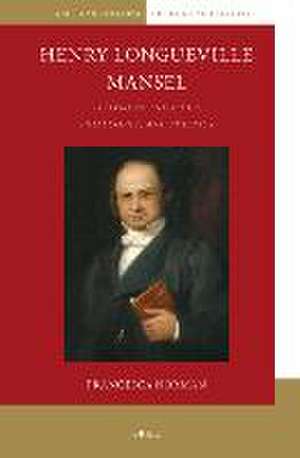Henry Longueville Mansel: Victorian Theology, Philosophy, and Politics: Anglican-Episcopal Theology and History, cartea 9
Autor Francesca Normanen Limba Engleză Paperback – 6 noi 2023
Preț: 387.67 lei
Nou
Puncte Express: 582
Preț estimativ în valută:
74.19€ • 80.56$ • 62.32£
74.19€ • 80.56$ • 62.32£
Carte indisponibilă temporar
Doresc să fiu notificat când acest titlu va fi disponibil:
Se trimite...
Preluare comenzi: 021 569.72.76
Specificații
ISBN-13: 9789004543249
ISBN-10: 9004543244
Pagini: 288
Dimensiuni: 155 x 235 mm
Greutate: 0 kg
Editura: Brill
Colecția Brill
Seria Anglican-Episcopal Theology and History
ISBN-10: 9004543244
Pagini: 288
Dimensiuni: 155 x 235 mm
Greutate: 0 kg
Editura: Brill
Colecția Brill
Seria Anglican-Episcopal Theology and History
Notă biografică
Francesca Norman, Ph.D., studied Theology and completed her doctoral thesis on Mansel at Canterbury Christ Church University in 2015. She is an Anglican and has keen interests in the history of the Church of England.
Cuprins
Acknowledgements
Preface
1 Introduction
1 Context
2 Methodology
3 Structure
2 Mansel’s Theological and Philosophical Ideas in Context: Biographical Account of Mansel’s Life and Work
1 Introduction
2 Family Background
3 Herbert Spencer and Katherine Mansel
4 Life at Oxford
5 Dean of St Paul’s
6 Conclusion
3 Mansel’s Theological and Philosophical Ideas in Context: The Historical Roots of Mansel’s Thought
1 Introduction
2 Bishop Peter Browne (c.1665–1735)
3 Bishop Joseph Butler (1692–1752)
4 Thomas Reid (1710–1796)
5 Friedrich Heinrich Jacobi (1743–1819)
6 Sir William Hamilton (1788–1856)
7 Conclusion
4 The Content of Mansel’s Philosophical Theology
1 Introduction
2 Theistic Personalism
3 ‘I-Thou’
4 Free Will
5 Negative Theology and Analogy
6 Prayer
7 Personal Relation
8 Theory of Relativity
9 Rejection of the Absolute
10 Limits of Ethical Knowledge
11 Conclusion
5 Mansel’s Theological and Philosophical Ideas in Context: Initial Reception
1 Introduction
2 Positive Responses (Oxford Tories and Alexander Campbell Fraser)
3 Post-Tractarian and Roman Catholic Responses (William George Ward and John Henry Newman)
4 Reception by ‘Agnostics’ (Herbert Spencer and Thomas Henry Huxley)
5 Metaphysical and Idealist Reactions to Mansel
6 Conclusion
6 Mansel, Political Networks and Personalities
1 Introduction
2 Mansel’s Religious Politics: Anglican Toryism
3 Lord Carnarvon
4 Gathorne Hardy
5 Salisbury
6 Conclusion
7 The 1859 Election and the Maurice Controversy
1 Introduction
2 The Context of the 1859 Election
3 The Mansel-Maurice Controversy in Political Context
4 Outline of a Controversy
5 Maurice and the Carlylean Doctrine of Certainty
6 Conclusion
8 The 1865 Election and the Mill Controversy
1 Introduction
2 After 1859: Gladstone and the Liberal Party
3 The Mansel-Mill Controversy in Political Context
4 Outline of a Controversy
5 Mill and the Comtean Religion of Humanity
6 Conclusion
9 Conclusion
1 Key Findings
2 A Reputation Sidelined
3 St Peter’s and St Paul’s, Cosgrove
Appendix: Literature Survey
1 Introduction
2 Victorian Biographical Studies
3 Literature on Mansel and the Agnostic Tradition
4 Mansel, Kierkegaard and Barth
5 Conclusion
Bibliography
Preface
1 Introduction
1 Context
2 Methodology
3 Structure
2 Mansel’s Theological and Philosophical Ideas in Context: Biographical Account of Mansel’s Life and Work
1 Introduction
2 Family Background
3 Herbert Spencer and Katherine Mansel
4 Life at Oxford
5 Dean of St Paul’s
6 Conclusion
3 Mansel’s Theological and Philosophical Ideas in Context: The Historical Roots of Mansel’s Thought
1 Introduction
2 Bishop Peter Browne (c.1665–1735)
3 Bishop Joseph Butler (1692–1752)
4 Thomas Reid (1710–1796)
5 Friedrich Heinrich Jacobi (1743–1819)
6 Sir William Hamilton (1788–1856)
7 Conclusion
4 The Content of Mansel’s Philosophical Theology
1 Introduction
2 Theistic Personalism
3 ‘I-Thou’
4 Free Will
5 Negative Theology and Analogy
6 Prayer
7 Personal Relation
8 Theory of Relativity
9 Rejection of the Absolute
10 Limits of Ethical Knowledge
11 Conclusion
5 Mansel’s Theological and Philosophical Ideas in Context: Initial Reception
1 Introduction
2 Positive Responses (Oxford Tories and Alexander Campbell Fraser)
3 Post-Tractarian and Roman Catholic Responses (William George Ward and John Henry Newman)
4 Reception by ‘Agnostics’ (Herbert Spencer and Thomas Henry Huxley)
5 Metaphysical and Idealist Reactions to Mansel
6 Conclusion
6 Mansel, Political Networks and Personalities
1 Introduction
2 Mansel’s Religious Politics: Anglican Toryism
3 Lord Carnarvon
4 Gathorne Hardy
5 Salisbury
6 Conclusion
7 The 1859 Election and the Maurice Controversy
1 Introduction
2 The Context of the 1859 Election
3 The Mansel-Maurice Controversy in Political Context
4 Outline of a Controversy
5 Maurice and the Carlylean Doctrine of Certainty
6 Conclusion
8 The 1865 Election and the Mill Controversy
1 Introduction
2 After 1859: Gladstone and the Liberal Party
3 The Mansel-Mill Controversy in Political Context
4 Outline of a Controversy
5 Mill and the Comtean Religion of Humanity
6 Conclusion
9 Conclusion
1 Key Findings
2 A Reputation Sidelined
3 St Peter’s and St Paul’s, Cosgrove
Appendix: Literature Survey
1 Introduction
2 Victorian Biographical Studies
3 Literature on Mansel and the Agnostic Tradition
4 Mansel, Kierkegaard and Barth
5 Conclusion
Bibliography








